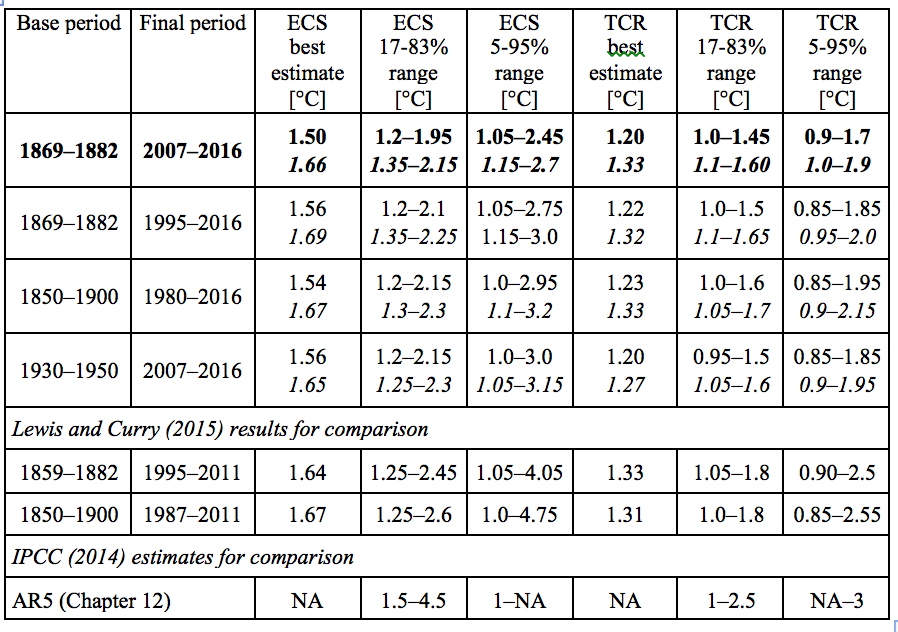 Al_U_Card, on 2018-August-06, 17:17, said:
Al_U_Card, on 2018-August-06, 17:17, said:
The best science (actually measured values) points to an ECS of 1.1 to 1.5 C. This is hardly worrisome and natural factors could override that change over the next century. Spend all you want, uselessly, on flights of fancy but don't expect the real science to support that decision. Once you see the entire story, the folly becomes obvious.
 PassedOut, on 2018-August-06, 17:24, said:
PassedOut, on 2018-August-06, 17:24, said:
LOL. There are no "actually measured values" from the future.

 Al_U_Card, on 2018-August-06, 20:03, said:
Al_U_Card, on 2018-August-06, 20:03, said:
Indeed. The referenced, peer-reviewed studies have all been posted here and are derived from actual temperature changes over time as well as [CO2]. Nothing to do with supposed feedback effects, just the actual ones.
No one knows yet what the actual ECS will turn out to be, so we are all dependent upon models that use existing data to project a future ECS value. All of the climate models plug in the "actually measured values" used in calculating their projections. Your claim that the "best science" points to a low-end ECS is nothing more than a claim that the model you prefer is "best" in some way, but you neither describe that model nor offer any justification for that assertion. Nor have you provided any reason to suppose that you'd be capable of doing so. Quite the opposite, in fact.
Indeed, scientists who do know what they are doing are closing in on a better estimate, and it is higher than the values that your secret model "points to."
New study ‘reduces uncertainty’ for climate sensitivity
Quote
The latest assessment report from the Intergovernmental Panel on Climate Change (IPCC) estimates that climate sensitivity has a “likely” range of 1.5 to 4.5C.
The new study, published in Nature, refines this estimate to 2.8C, with a corresponding range of 2.2 to 3.4C. If correct, the new estimates could reduce the uncertainty surrounding climate sensitivity by 60%.
The narrower range suggests that global temperature rise is “going to shoot over 1.5C” above pre-industrial levels, the lead author tells Carbon Brief, but “we might be able to avoid 2C”. Meeting either limit will likely require negative emissions technologies that can remove CO2 from the atmosphere, he says.
The new estimate is another “brick in the wall” of scientists’ understanding of climate sensitivity, another scientist tells Carbon Brief, and “the best-informed views will be reached by multiple lines of evidence”.
So it looks like we'll avoid hitting the 4+C extreme on the high side, but we'll have to make a strong effort to keep the rise to around 2C.
Whatever model that you are using to "point to" a low ECS is way off the mark.
The growth of wisdom may be gauged exactly by the diminution of ill temper. — Friedrich Nietzsche
The infliction of cruelty with a good conscience is a delight to moralists — that is why they invented hell. — Bertrand Russell

 Help
Help




